Business and Human Rights (142 found)
Economics of Peace and Conflict
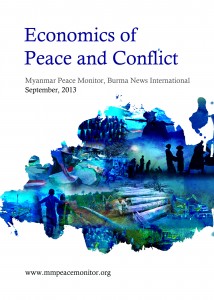 This report aims to clarify the complex processes of solving economic grievances related to the peace process. Examining how these efforts work and how the different actors, policies and projects make up a larger framework may help in assessing how well they respond to the roots of conflict. It especially tries to understand how the many different ministries, committees, international donors, CBOs, businesses (domestic and foreign) and NSAGs work together, overlap, or contradict each other in achieving economic and development goals for national peace […]
This report aims to clarify the complex processes of solving economic grievances related to the peace process. Examining how these efforts work and how the different actors, policies and projects make up a larger framework may help in assessing how well they respond to the roots of conflict. It especially tries to understand how the many different ministries, committees, international donors, CBOs, businesses (domestic and foreign) and NSAGs work together, overlap, or contradict each other in achieving economic and development goals for national peace […]
Disputed Territory: Mon Farmers’ Fight Against Unjust Land Acquisition and Barriers to Their Progress
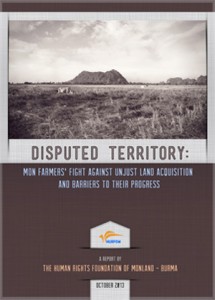 Over the years HURFOM has produced a number of accounts highlighting the hardships faced by Mon farmers who became victims of land confiscation or unjust land acquisition. In this report HURFOM follows-up on previously documented abuses and concentrates on an emerging new trend: farmers’ active and collective pursuits for rights to their land.
Over the years HURFOM has produced a number of accounts highlighting the hardships faced by Mon farmers who became victims of land confiscation or unjust land acquisition. In this report HURFOM follows-up on previously documented abuses and concentrates on an emerging new trend: farmers’ active and collective pursuits for rights to their land.
Disputed Territory aims to elaborate on the activities of and express solidarity with farmers who are resolutely, and in some cases for the first time, seeking justice regarding their land […]
Mining in Conflict Zones: A New Form of Military Offensive
The Burmese government has been granting mining concessions throughout Karenni state even though no political negotiations to bring about lasting peace have begun with the Karenni resistance forces. This is a ploy to benefit economically from exploitation of local natural resources while strengthening Burmese military control over the Karenni people […]
• • •Corporate Accountability in ASEAN : A Human Rights-Based Approach
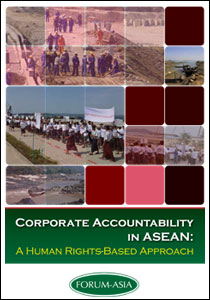 Corporate Accountability in ASEAN: A Human Rights-Based Approach assesses the impacts of business on human rights in the ASEAN sub-region. Originating from cases presented at two public hearings organised by civil society groups in 2011 in response to the ASEAN Intergovernmental Commission on Human Rights (AICHR)’s undertaking of a thematic study on the topic of “corporate social responsibility” (CSR) in ASEAN, this report documents cases of human rights violations in relation to business activities in the sub-region, and demonstrates that voluntary CSR initiatives promoted by businesses – and by ASEAN institutions – are insufficient […]
Corporate Accountability in ASEAN: A Human Rights-Based Approach assesses the impacts of business on human rights in the ASEAN sub-region. Originating from cases presented at two public hearings organised by civil society groups in 2011 in response to the ASEAN Intergovernmental Commission on Human Rights (AICHR)’s undertaking of a thematic study on the topic of “corporate social responsibility” (CSR) in ASEAN, this report documents cases of human rights violations in relation to business activities in the sub-region, and demonstrates that voluntary CSR initiatives promoted by businesses – and by ASEAN institutions – are insufficient […]
Report on the Human Rights Situation in Burma (January 2013 – June 2013)
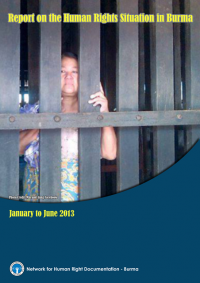 Over the six months from January to June 2013, ND-Burma documented 147 human rights violations across Burma. These violations occurred in areas of armed conflict but also in areas covered by ceasefires. Each violation is a specific incident, but it may involve any number of victims, from one victim of killing, to forced labor involving many victims, to the forced displacement of an entire village. ND-Burma’s findings demonstrate that, despite progress in reaching ceasefire agreements with non-state armed groups, the government has made little progress protecting the human rights of its citizens. Furthermore, continued arrests of human rights defenders demonstrate that the government is not serious about working with civil society to protect human rights […]
Over the six months from January to June 2013, ND-Burma documented 147 human rights violations across Burma. These violations occurred in areas of armed conflict but also in areas covered by ceasefires. Each violation is a specific incident, but it may involve any number of victims, from one victim of killing, to forced labor involving many victims, to the forced displacement of an entire village. ND-Burma’s findings demonstrate that, despite progress in reaching ceasefire agreements with non-state armed groups, the government has made little progress protecting the human rights of its citizens. Furthermore, continued arrests of human rights defenders demonstrate that the government is not serious about working with civil society to protect human rights […]
Drawing The Line: The Case Against China’s Shwe Gas Project, For Better Extractive Industries in Burma
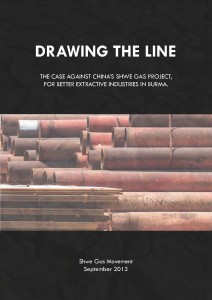 The Shwe Gas project, the largest extractive project in Burma, set to earn US$54 billion for the Burmese government, has just begun transferring Burma’s natural gas to China. As the first such project to become operational under the new quasi-civilian government, its management will set the precedent for how future extractive projects will be carried out as Burma opens up for investment and resource bidding. As it stands, the standard is not good […]
The Shwe Gas project, the largest extractive project in Burma, set to earn US$54 billion for the Burmese government, has just begun transferring Burma’s natural gas to China. As the first such project to become operational under the new quasi-civilian government, its management will set the precedent for how future extractive projects will be carried out as Burma opens up for investment and resource bidding. As it stands, the standard is not good […]
EU Restoration of Myanmar Preferential Trade Regime: Neglect of Human Rights Concerns?
On 19 July 2013, the European Union brought Myanmar back into the so-called “Everything but Arms” regime, a preferential trade regime within the “Generalised Scheme of Preferences”. Although the EU claims this decision will facilitate the country’s path to democracy and development, it has been strongly criticised by numerous human rights organisations […]
• • •Business & Human Rights in Myanmar: A Round-Up of Recent Developments
This briefing summarises major business and human rights developments in Myanmar (Burma) from November 2010, when the country held its first elections after 20 years and pro-democracy leader Aung San Suu Kyi was released from house arrest, to the present. It covers the positive and negative impacts of companies operating in the country, and is based on reports from a range of sources that the Resource Centre has featured on its website and in its Weekly Updates. It also refers to responses we received from companies when we asked them to reply to concerns raised by civil society, and refers to the failure of certain companies to respond […]
• • •Good Governance and the Extractive Industry in Burma
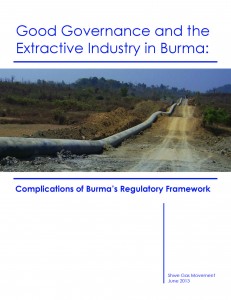 As the country begins to open up for the first time in more than 60 years, foreign investors and energy consumers worldwide are beginning to look progressively towards Burma and its rich natural resources. Aimed at policy makers, investors, corporations, various governments, intergovernmental groups and other stakeholders, this briefer seeks to highlight the necessity of a sound domestic legal framework in Burma through a critical analysis of the current limitations and implications thereof […]
As the country begins to open up for the first time in more than 60 years, foreign investors and energy consumers worldwide are beginning to look progressively towards Burma and its rich natural resources. Aimed at policy makers, investors, corporations, various governments, intergovernmental groups and other stakeholders, this briefer seeks to highlight the necessity of a sound domestic legal framework in Burma through a critical analysis of the current limitations and implications thereof […]
Model Villages Are Not a Model
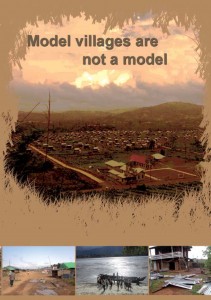 This short report by Mungchying Rawt Jat (MRJ) documents cases of farmers who have been forcibly relocated to make way for “development” projects in Kachin State, and are now staying in Sanpya camp in Hugawng Valley, and Aung Myin Thar and Maliyang camps near the Irrawaddy Myitsone.
This short report by Mungchying Rawt Jat (MRJ) documents cases of farmers who have been forcibly relocated to make way for “development” projects in Kachin State, and are now staying in Sanpya camp in Hugawng Valley, and Aung Myin Thar and Maliyang camps near the Irrawaddy Myitsone.

 All posts
All posts